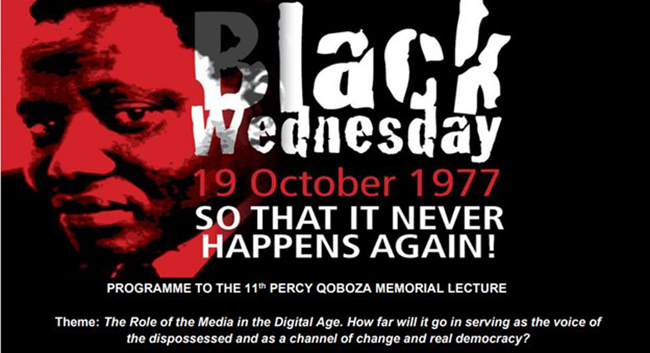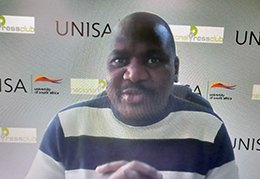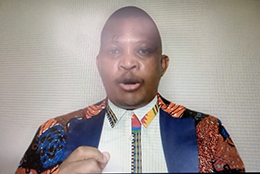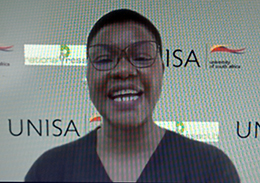News & Events
‘We need to be aggressive in tackling injustice’
In an effort to embrace the memory of Black Wednesday, the National Press Club (NPC), in partnership with Unisa and the Qoboza family, hosted the 11th Percy Qoboza Memorial Lecture on 19 October 2021. The theme was The role of the media in the digital age. How far will it go in serving as the voice of the dispossessed and as a channel of change and real democracy?.

Watch a recording of the lecture here.
Exactly 44 years ago on this day, the apartheid government banned black consciousness organisations and a number of publications, and arrested prominent journalists including Percy Qoboza, editor of The World and Weekend World newspapers.
The event began with a moment of silence for Val Boje, veteran journalist and chairperson of the NPC, who recently passed away.
In welcoming everyone, Unisa’s Chair of the Communication Science Department, Professor Siyasanga Tyali, said that questions on the state of the media cannot be swept under the carpet as they are too important for any democracy. He reflected on this annual event since its inception, and stated that every year, a bursary is awarded to one excelling Unisa Honours in Media Studies student. This year’s recipient was Jordan Scotland Felix.

Dr Sizwe Mpofu-Walsh
Vigorous action required
Dr Sizwe Mpofu-Walsh, a South African author, scholar, activist and media innovator was the keynote speaker. He authored a best-selling book in 2021 titled The New Apartheid. Mpofu-Walsh began by quoting Qoboza: “People must be aggressive in their efforts to transform an unjust society into a just society. We will have to encourage a vigorous campaign to remove racial discrimination in all its forms”.
Referring to Qoboza as South Africa’s journalistic and political ancestor, he stated: “From a noble and peaceful perspective, Qoboza urges us to be aggressive in tackling injustice, as injustice is aggressive in its oppression even today. It is time for us to look at our society and all its injustice and inequality with new eyes and fundamentally re-orient our actions.”
Mpofu-Walsh argues that the celebration of the country’s democracy and the constitutional order that followed, have, in many ways, clouded South Africans’ vision. He raised a concern on how South Africans have normalised the racialised and engendered suffering around them. He added: “We have lost sight of the residual effects of apartheid that continue to dominate our democracy and country. The goal of apartheid, according to its creators, was to implant it so deeply into South African society that no democratic government would be capable of uprooting it.”
Tracing patterns of apartheid in the media
Reflecting on the traces of apartheid in established media, especially in the private sphere, Mpofu-Walsh said: “Apartheid did not die, rather it was privatised, therefore we need to turn our attention to the private realm and those who hold private power. We need to understand how apartheid has taken on a new life in the current moment. Apartheid is the ideology of minority control.”
Mpofu-Walsh remarked that despite the demographic makeup of the country and the predominance of black citizens, in the spaces that matter where real decisions are made, including in the private realm of South Africa’s media, the demographic majority becomes the minority, both in terms of race and gender.
The marginalisation of voices that matter the most
Quoting from the latest State of the Newsroom Report published by the University of the Witwatersrand’s School of Journalism, Mpofu-Walsh stated: “49% of newspaper editors are black South Africans, while 28% are white. This does not call for a celebration but shows how little has changed in three decades. We have a vast and disproportionate overrepresentation of white voices in our editorial spaces and an underrepresentation of black voices.”
He further stated that 67% of newspaper editors are men, while 33% are women. “Black women voices in particular are underrepresented. These crucial voices deserve to have the greatest amount of space in our public debate.”

Prof Mandla Radebe
Addressing thorny issues in the media
During a panel discussion and question-and-answer session, associate professor of Strategic Communication at Wits, Mandla Radebe, argued that capitalism is a law that propels the reproduction of colonialism and apartheid. “It is the engine upon which all forms of oppression and discrimination are founded and constantly rewarded,” he continued. “The commercially dominated media is fundamentally unable to transform. We need to think of an alternative that will essentially ensure that it has a public character and is accessible to all.”

Lorato Tshenkeng
The founder and chief executive of Decode Communications, Lorato Tshenkeng, remarked: “The role of the media in society, in terms of its position and what it ought to serve, is not questionable.” He added that the digital revolution should be democratised, which will quicken the role of the media in any thriving democracy.

Phathiswa Magopeni
The South African Broadcasting Corporation’s Head of News and Current Affairs, Phathiswa Magopeni, contended: “The issue of the sustainability of news media is directly linked to its ability to serve as a channel for change and striving for democracy. While there is excitement around the ability of digital platforms to democratise information, the reality is that the cost of doing so remains prohibitive for the majority and the dispossessed.” Magopeni spoke strongly on how inclusive the media should be.
In closing, a message of appreciation was delivered by a representative of the Qoboza family. “We take cognisance of the threats to the lives of journalists and their families,” he said. “We want to reiterate unapologetically our support for journalists who stand up for the right to accountability and the right to speak truth to power. It is, therefore, imperative that we do not take these rights lightly, but make sure that we protect them all the time.”
*By Nancy Legodi, Acting Journalist, Department of Institutional Advancement
Publish date: 2021/10/21
